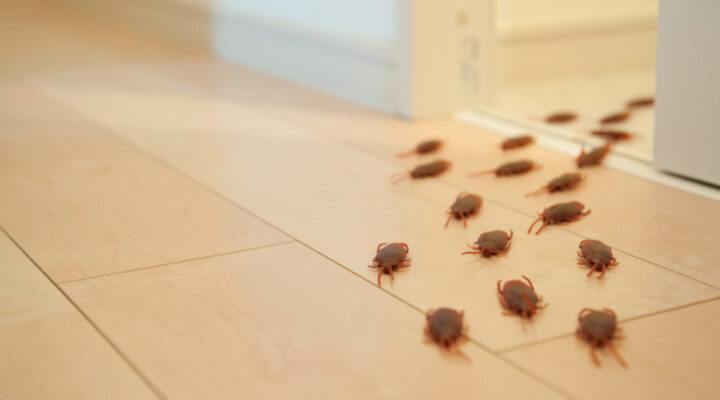
Have you noticed an increasing presence of insects in your home? Seeing a bunch of pests roaming around the house is neither pleasant nor healthy for household members. In case the infestation isn’t in full swing yet, there are several methods you can use to deny these disgusting creatures access to your home.
Pests take advantage of their small size and the heightened sense of smell to locate the right entry point. These creatures are experts at finding gaps, smelling food from a long distance, and moving inside plumbing or duct systems.
We hope these practical tips will assist you in discouraging pests from infesting your household.
Don’t let them enter your home
Pests are remarkably persistent creatures, entering homes by sliding through the smallest of cracks in floors, windows, doors, and walls. Hence, homeowners in Adelaide are recommended to block potential entry points to reduce the risk of infestation. Take a look at the following link, https://www.ecowatch.com/10-natural-ways-to-keep-insects-out-of-your-home-1881969885.html, to check out ten natural ways of keeping insects out of your home.
Furthermore, start pest-proofing your home by inspecting your doors and windows for cracks and gaps by using weather strips or foam tape. These aren’t the only entry points for insects, which means you need to keep searching for other types of crevices. It’s crucial to check the foundation, roof, plumbing system, and wiring for damage. Pests would use any kind of opportunity to gain access to the house, even if such a scenario isn’t likely to cross your mind.
For instance, a missing or broken shingle on your roof represents an ideal point of entry for these annoying invaders. Also, insects tend to move through the plumbing system in the search for potential cracks in the toilet, sink, or any pipe. Therefore, make sure you use silicone for sealing all types of major and minor gaps in pipes, sinks, duct systems, baseboards, etc.
Eliminate standing water
Standing water in the yard is another welcoming gesture for pests to make themselves at home in your house. Mosquitos are particularly fond of standing water as it associates them with breeding. If you don’t want mosquitos to start a family under your roof, get rid of all stagnant water both outside and inside your house.
Most pest control specialists advise homeowners to keep their drains perfectly clean in order to remove dirty water from the inside. Filthy water inside drains is often the cause of catching a disease like malaria, borne by mosquitos. Make sure you click here to get familiar with the vast choice of pest control olathe ks services provided by exterminators in Adelaide. These professionals advise homeowners to refrain from pouring bleach down the drain, as it releases harmful fumes. Instead of bleach, use a combination of baking soda and white vinegar.
Besides keeping their drains clean, residents of Adelaide are suggested to practise other useful methods of eliminating stagnant water. For instance, homeowners using ductless, mini-split air conditioners shouldn’t allow the water removed from the unit to collect in a container but find an alternative method to prevent water stagnation. Also, the plant saucer trays outside the house aren’t supposed to hold water but drain it properly.
Practise regular garbage disposal
A simple but effective method for keeping pests away from your household is by disposing of your garbage regularly. If possible, make sure you dispose of the litter on a daily basis instead of doing it twice a week. The more household rubbish you accumulate, the greater the likelihood of attracting rodents and destructive insects.
Taking the garbage outside the house by transferring it to the bins in your yard isn’t a proper solution. Bear in mind that pests usually consider yard waste as a source of food or an opportunity to nest. In order for these annoying creatures to have no access to your yard waste, the lids of the bins should be fitted attentively, as well as cleaned regularly. Additionally, garden and leaf waste should be taken care of to impede pests from making nests.
Install the right light bulbs
Light bulbs are rarely associated with the possibility of pest infestation, which is why most Adelaide residents end up using the wrong type of bulbs. Instead of mercury light bulbs, homeowners are suggested to install halogen bulbs. The tints of halogen lights aren’t exactly appealing to insects, particularly the yellow and orange tones.
Furthermore, the greatest number of household members decide to locate outdoor lighting too close to the front door, which facilitates the access of insects inside. Hence, try locating the bulbs as far away from the house as possible while ensuring proper illumination.
Be careful when storing food
Pests are amazingly fond of food, using nothing but their smell to locate the source inside the house. Household members are encouraged to refrain from leaving overripe fruits and vegetables, as well as open food containers on the counter for longer periods.
In addition, rodents are especially attracted by pantry foods like crackers, mixed nuts, and dried fruit, which aren’t stored correctly in most cases. If you can’t seal the packaging, use another container to store the food instead of leaving the package partially open.
When it comes to fruits and vegetables, it’s essential not to let them overripe. Once the rotting process starts, these become appealing to cockroaches, flies, and other annoying insects.
Declutter your home
Keeping your house clutter-free is yet another way of discouraging pests from seeking shelter on your property. It’s important for every homeowner to get rid of old cardboard boxes, magazines, newspapers, plastic bags, and other items that pests use as hiding points.
It could be the right opportunity to organize a garage sale and even earn some money from decluttering the house. Leaving no trace of your old belongings will certainly aid your fight with these destructive invaders.
Bottom line
As long as you keep your home free of clutter, standing water, rotten food, and waste, there’s no reason to fear pests!
Leave a Reply